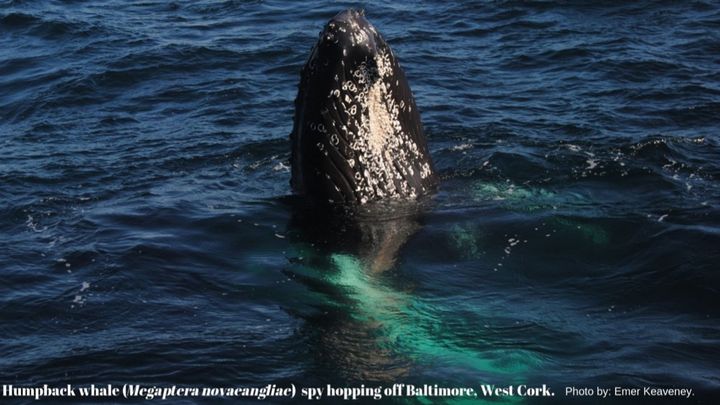
Fluke Follow Project: Snot for Science!
Donation protected

Fluke Follow Project: Snot for Science.

Hi, I'm Emer,
I'm a marine biologist, ocean eduactor and co-founder of Ocean Research & Conservation Ireland (O.R.C.). I was born and bred in Cork, the south coast of Ireland and I need your help to study whales that visit Irish waters as part of my P.h.D. research!
A little bit of context
Humpback whales are seasonal visitors to Irish waters, using our rich marine habitats as foraging grounds, feeding on forage fish species such as, herring and sprat, with sightings from West Cork, Co. Kerry, and even Co. Donegal. Since 2018, we have collected 17 humpback whale photo I.D. images from the south coast of Ireland and even the south coast of the U.K. with the help of our mobile phone recording tool " The Observers App" and managed to capture the second largest animal on Earth with a drone in preliminary studies for licenced research. Previous research by National Geographic Explorer and fellow Corkonian, Dr. Conor Ryan showed that humpback whale sightings have been increasing in Irish waters in recent years...

But there’s a problem
As sightings are increasing, so too are human pressures, with more eco-tourism increasing more then ever, coinciding with an increase of cargo, tanker and cruise liner vessels along the south coast of Ireland, heading to one of Europes biggest shipping ports, Cork Harbour. Baleen whales, such as humpback whales and fin whales face a serious threat of disturbance from noise pollution. These whales depend on sound to navigate and to communicate during coordinated foraging behaviours, such as bubble net feeding, which we witness off the south coast of Ireland. Furthermore, there is a need to analyse the effect of eco-tourism on whale's behaviour and to encourage best practice for whale and dolphin watching in Ireland.
Here’s what we’re doing about it
We are conducting dedicated monitoring of baleen whales in feeding grounds along the south coast of Ireland using small unmanned aircrafts (SUAs) or drones, which will allow the non-invasive collection of aerial imagery, DNA from respiratory vapour samples and the analysis of behaviour in relation to human activities in the area at the time of and during the encounter. We conduct research on-board eco-tour vessels trained in our "Best Practices", allowing responsible boating protocal which often yield close encounters charasmatic species like the humpback whale.
The use of drones for marine mammal observation is a novel monitoring method in Ireland. Photogrammetry using aerial imagery can be applied to asses the health status of the whales, while analysis of respiratory vapour samples can reveal DNA markers that can help elucidate population dynamics and migratory movements of whales that visit Irish shores. Analysis of the effects of eco-tourism and prediction of potential risk to shipping is of conservation importance for marine managers in order to meet international and national legislative requirements for the adequate management of protected species such as humpback whales in Irish waters.
What are our research questions?
Q. 1) To determine the behavioural impact and risk of disturbance from human activities, i.e. eco-tourism, shipping and offshore renewable energy on baleen whales using SUAs (small unmanned aircrafts).
Q. 2) To determine the level of genetic overlap within foraging groups of humpback whales and between temporally separate subpopulations.
Q. 3) To develop a catalogue of genetic markers to complement our baseline catalogue of 17 individuals.
Q.4). To estimate the contribution of a particular breeding ground to the composition of humpback whales in Irish waters, such as from Guadalupe, Lesser Antilles, Caribbean over 6,000 km away.
And here is how it’s going to change the world, this project has a unique social science aspect, in that we have developed a free educational and citizen science recording tool "The Observers App", with a specific humpback whale recording form to allow people who spend time at sea and might encounter humpback whales can get involved and submit a record to us, directly - quickly and easily, contributing to their conservation through crowdsourced research.

This app will help with public out-reach, science communication and ocean literacy skills among the coastal communities of Ireland and indeed within the cities also.
You can join us!
We need to raise 6,000 euro to cover general field costs for this project.
Any donation big or small is greatly appreciated! For more info please visit: https://www.orcireland.ie/fluke-follow-project
 Organizer and beneficiary
Organizer and beneficiary
Emer Ní Caomhánaigh
Organizer
Emer Keaveney
Beneficiary